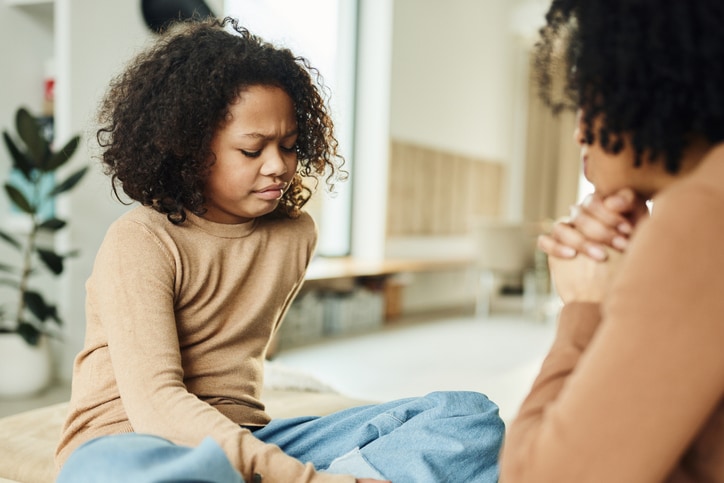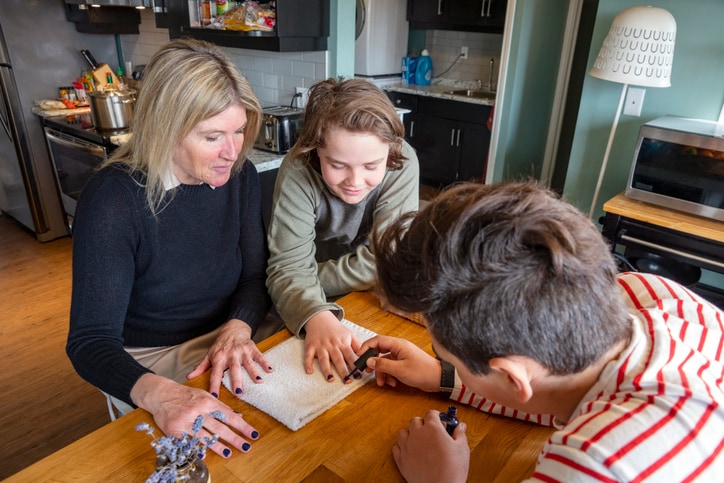Parents can lose sleep wondering about the things our kids don’t tell us. Maybe they are uncomfortable around an adult they see on a regular basis. Maybe they have a weird feeling about an environment they’re in. But, kids aren’t psychologists — they don’t always sit down on the couch and share their feelings about awkward, confusing or tough topics. So, it’s up to parents to learn the ways that kids do try to tell us when they don’t feel safe.
As a parent of five who has been through plenty of awkward situations alongside my kids, I thought I was well-versed in recognizing when they didn’t feel safe or happy. Yet somehow, I still missed a key sign when one of my kids was suddenly hesitant to go to a playdate he’d normally want to go to. He didn’t say anything specific when I asked all the usual questions that would indicate red flags; he just didn’t want to go, on a perfectly boring Saturday with nothing else to do.
Regretfully, I brushed it off, but multiple mama-gut red flags went up as I dropped him off. The home, the parents and the whole vibe didn’t feel right. I picked him right back up shortly after. Later, I found out that the parents definitely don’t parent how I would, and the expectations in the house were much different from ours, to put it nicely. I was disappointed that I’d missed the signs.
“As an experienced mom who has been in these situations before, why didn’t I see that my kid didn’t feel safe or comfortable?”
Kids say and do odd things all the time, and it isn’t always for legitimate reasons. But, as an experienced mom who has been in these situations before, why didn’t I see that my kid didn’t feel safe or comfortable there? Here’s what I wish I’d known and the sneaky signs of anxiety in kids that experts say to look for.
What are the signs that kids feel unsafe?
Sometimes kids literally don’t have or know the words to tell what they feel, says Dr. Chad Lennon, child and adolescent psychiatrist at Sheppard Pratt in Elkridge, Maryland. “Many people in general, including adults, lack the emotional vocabulary to express themselves in words. Sometimes, it is a matter of the emotion itself being surprising. If a person does not know how and why a feeling emerges, it’s hard to talk about it.”
“Children often communicate their discomfort through changes in behavior rather than direct communication,” adds Daniel Rinaldi, a therapist and life coach at Mind Noise in Massachusetts and the father of a 6-year-old girl. These behavior changes can include:
- Becoming unusually quiet.
- Retreating to their bedroom.
- Showing signs of aggression.
- Tantrums or meltdowns.
“Children express feelings of uncomfortableness through their body, so they may act younger than they are, in a regression, or even shut down emotionally because they simply don’t know how to handle the emotions they are feeling,” he adds.
How to tell if kids need help in an unsafe situation
Not every situation that feels “off” to kids is necessarily a life or death event, or even one where something bad can happen. Sometimes, they simply don’t feel like they can be themselves in a certain environment, or they aren’t sure they have the support to get what they need.
Lennon says parents have to develop a comfort level in facing uncomfortable conversations, whether it’s about a safe or unsafe situation or a “tricky topic” you need to discuss in order to keep them safe and healthy.
“It may feel uncomfortable to talk to teens about sexual health, gender, relationships, substance use, consent and other tough topics. Other tricky topics may include ‘firsts’ like a first sleepover, first time driving or going to a party, or first time going to therapy,” he says. “When parents don’t have these conversations with their own children, kids often look to the media, the internet or their peers for guidance.”
How to help kids manage anxiety about unsafe situations
When kids try to communicate anxiety, discomfort or that they feel unsafe, here’s what the experts recommend to ensure you are able to hear what your child is saying.
Be aware that you must be a listener first and a talker second. It is important to ask questions out of curiosity, not demand an answer from your child.”
— Dr. Chad Lennon, child and adolescent psychiatrist
1. Build a “listening-first” environment
“It is vital — and hard — to remain calm with a non-judgmental and open tone. Be aware that you must be a listener first and a talker second. It is important to ask questions out of curiosity, not demand an answer from your child,” Lennon says.
He urges parents to allow the child to fully answer questions. “Parents should create a safe space to have emotional conversations with kids that may be either negative or positive, like asking about their child’s experiences during summer camp,” he explains.
2. Be OK with them trusting other adults
Maybe it’s a grandma or a trusted uncle, a babysitter or an older sibling. It’s not as important for kids to come to you, specifically, but rather that they have someone to go to. “Be comfortable with having a support system of people. Kids may not like to talk openly about everything with their parents, but they might have an uncle they feel comfortable opening up to about some things, a coach for another, a teacher for another, a therapist for another, etc.,” Lennon says.
There’s an important catch here: “Make sure, as a parent, you keep in contact with the adult support system,” he adds. “That does not mean you shouldn’t try to have conversations with your kids first, but it is important to understand when someone else may be able to provide more support, and then bring that person into the conversation.”
3. Help them find words to describe their feelings
Kids aren’t born knowing how to say, “Hey, I don’t feel comfortable at this house because they parent differently than you do and it feels weird in there.” Giving them emotional education beyond the rudimentary “happy, sad, mad” words of preschool is a must.
Lennon recommends the “feelings wheel” tool, which I’ve since printed and posted on the fridge. Even just having my kids read and ask questions about these words has been helpful.
“Model to your kids using feeling words and describing your emotions (‘I am annoyed because the washing machine broke.’ ‘I am overwhelmed because I have a big project at work.’),” says Dr. Beth Oller, a family medicine physician for Rooks County Health Center in Plainville, Kansas. “Encourage them to put what they are feeling into words — ‘It looks like you are really frustrated. Can you tell me about it? What can we do to make that better?’”
Rinaldi proposes asking a slightly different question — “Do you feel happy and safe when you’re with [person/place]? Is there anything that makes you feel yucky or scared?” Even the word “yucky” can help them explain a feeling they don’t quite understand.
4. Give yourself grace
Oller recalls when her now 11-year-old child was left home alone a few years ago due to a miscommunication with a friend’s family, causing years of anxiety over the safety of visiting friends’ houses.
“We continued to talk with her, encouraged her to talk to us, brainstormed ways to start doing more independent activities in small steps and had her talk to a counselor,” she says. “Little by little, we made steps forward, but it was another two years before she spent the night at someone’s house.”
She adds that parents need to keep in mind that “things like this can happen to any of us.”
The bottom line
I’ve learned that listening quickly to that nagging mama-gut feeling is never wrong, even if our kids haven’t yet verbalized why. Kids don’t always know how to communicate their feelings, but with careful conversation, good listening skills and support from other trusted adults, it’s possible to tune into their emotions and help them navigate any situation.






